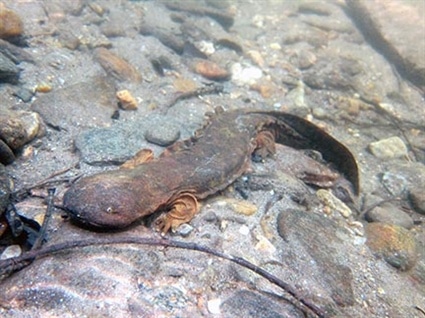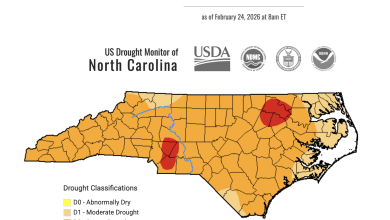
Last Updated on September 28, 2020 1:30 pm
RALEIGH, N.C. (Sept. 23, 2020) — With fall fishing right around the corner, the N.C. Wildlife Resources Commission is asking the public, particularly anglers, to report any sightings of hellbenders (water dogs) to the agency.
Reported sightings are an important part of a long-term inventory and monitoring project for hellbenders that agency staff, along with partners, began in 2007. Agency biologists want to learn more about where hellbenders—gigantic, aquatic salamanders averaging 16 to 17 inches in length—are located and how their populations are faring.
In North Carolina, hellbenders are found only in fast-moving, clean mountain streams in the western part of the state. Hellbenders, also called “snot otters” and “Alleghany alligators,” were once common but have disappeared throughout much of their habitat, due mainly to declining water quality and habitat degradation, and to a lesser degree, persecution from anglers who mistakenly think that hellbenders decrease trout populations.
Although they may occasionally go after a trout on a line or stringer, looking for an easy meal, hellbenders eat mainly crayfish according to Wildlife Diversity Biologist Lori Williams, who pioneered the Commission hellbender project. “They may also eat unsuspecting minnows and scavenge for dead fish, discarded bait or other dead animals. However, fish can be bigger predators of young or larval hellbenders than hellbenders of fish.”
Contrary to popular belief, hellbenders are not poisonous, venomous, toxic, or harmful to humans, although they may try to bite as a defensive reaction if someone tries to pick them up. Leaving them alone is not only good for hellbenders, but it is also the law. Hellbenders are listed as a species of special concern in North Carolina. Because of this listing, it is illegal to take, possess, transport, or sell a hellbender or to attempt to do so. A violation is a Class 1 misdemeanor, which can result in a fine and up to 120 days in jail.
Williams also cautions people to refrain from moving rocks in mountain streams to build dams, rock stacks (cairns), or tube chutes as these rocks provide shelter for hellbenders, as well as other species of fish, salamanders, and insects.
Anyone who finds a hellbender is asked to leave it alone but to note the location (physical location or GPS coordinates) and take a photo, if possible, and email that information to Williams at lori.williams@ncwildlife.org. If anglers happen to catch one on hook and line, they should carefully remove the hook if it is safe to do so without harming the animal or cut the line as close as possible and return it back to the water. People also can call the Commission’s Wildlife Interaction Helpline (866) 318-2401 and provide details of the observation.
Learn more by visiting the Commission’s hellbender webpage.

















